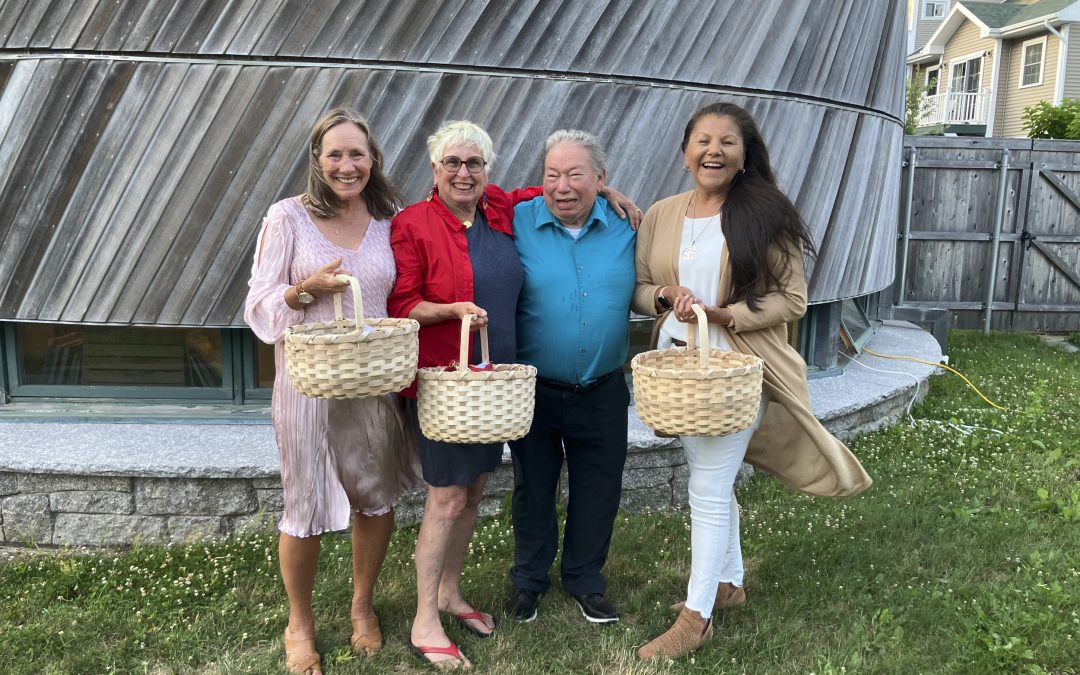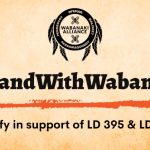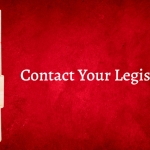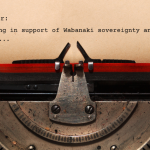Shown (l-r) are Beth Ahearn, Carol Wishcamper, Mi’kmaq Nation Vice Chief Richard Silliboy, and Rena Newell. Ahearn, Wishcamper and Newell were honorees at the 2024 Nihkaniyane: Let’s Go Forward Together celebration.
Thank you!
We are so grateful to everyone who donated in support of the Wabanaki Alliance this Giving Tuesday, helping us raise money to continue our work toward recognition and respect for Wabanaki self-determination! If you haven’t yet had a chance to contribute, you can read more about our work this year and donate through the link below. We look forward to your support as the 132nd Legislature begins its work in earnest this January!
The Wabanaki Alliance wishes to extend a heartfelt thank you (Woliwon, Welalin, Woliwoni) for all of the support we received throughout the year for our efforts to restore the recognition of the inherent tribal sovereignty of the Wabanaki Nations in our homelands now called Maine. The 1980 Maine Indian Land Claims Settlement and Implementing Acts have created unique barriers to self-determination and since 1980 the tribal nations here have had imposing restrictions on equal access to rights and resources that are available to all other tribal nations throughout the United States.
The work of a collaborative effort between the tribal governments and the State of Maine government in 2019 produced a way forward in the form of a set of consensus recommendations seeking to amend this oppressive set of conditions the tribes have been subject to, but also to improve the tribal-state relationship and usher in a new era of peace and understanding. With the hard work and support of tribal leaders and citizens, lawmakers and advocates, allies and friends, and so many of you, this taskforce vision has been realized one piece of legislation at a time. We have been able to restore taxation provisions, institute a collaboration policy with state government, we have begun to fix the human rights crisis of the Passamaquoddy Tribe at Sipayik not having clean drinking water, and we have guaranteed revenue from mobile sports betting for tribal nations’ economies. This work is not possible without the coalition we have built together and when we come together around reaching for equity, justice, and progress, we have seen not just results but we have seen joy and healing.
The Harvard Report researchers affirmed many things that Wabanaki people and our allies had long since believed to be true and also uncovered information that is revealing and inspires hope. The Wabanaki Nations have been held back by the restrictive nature of the 1980 Acts and have lower socioeconomic outcomes and statistics that point to a need for change. Our communities aren’t the only ones impacted; the trend continues and the stunted economic development extends to the surrounding rural municipalities and if tribal governments and economies were doing better, it would uplift our neighbors and benefit the entire state.
Another key finding that feels timely and important is that one of the biggest indicators of positive outcomes across a variety of factors is when a tribal nation has a strong tribal court. The most significant bill we were able to pass into law last year was based on a group of task force recommendations to expand criminal jurisdiction for tribal courts. We are happy to report that because of this law we are able to hear most felony cases in tribal courts now in cases that qualify for our jurisdiction. This is extremely beneficial for the safety and well-being of our people as well as our ability to govern and care for our communities as sovereign nations.
In order to improve the conditions for Wabanaki Nations and our neighbors, we need the jurisdictional abilities, authority, and access to federal law that all other tribal nations have. When we were able to work with state and federal leaders to extend Violence Against Women Act provisions to the Wabanaki, we immediately took bold action to combat the Missing and Murdered Indigenous Women (and People) Crisis because we now have the ability to bring domestic violence cases with a non-tribal perpetrator into tribal court if the conditions fit our jurisdiction. Getting access to this law took us seven years of work, advocacy, resources, and heartache. We should not need to go through such a heavy lift to access the 150 other laws passed since 1980 but not applicable to Wabanaki Nations because of the restrictive language of the settlement acts. We need your help to create lasting change and restore these rights and freedoms!
In July of this year, we came together to reflect and celebrate our recent efforts and look to the future holding the second Nihkaniyane (let’s go forward together) event. We honored three incredible women for their leadership – Rena Newell, Carol Wishcamper, and Beth Ahern. A tribal leader, a champion ally, and a loving advocate. They were gifted baskets made by Mi’kmaq Nation Vice Chief and Wabanaki Alliance board member Richard Silliboy who is an artist embodying the present-day existence and power of our ancestral art forms. We were also honored by five Tribal Chiefs attending to support our achievements and our honorees: Kirk Francis, Penobscot Nation; Clarissa Sabattis, Maliseet; Pos Bassett, Passamaquoddy; Edward Peterpaul, Mi’kmaq; and Hugh Akagi, Passamaquoddy. In attendance were tribal citizens, lawmakers, constitutional officers, allies, friends, and so many members of our coalition working hard to make this event a success.
We came away from this night with feelings of accomplishment for the funds raised and smoothness of the program, but we also felt a deep sense of community and connectedness to everyone who shows up time and time again for the Wabanaki Alliance. We have built something here that will last long after the State of Maine recognizes our inherent rights. Our people have lived in these lands since time immemorial. Through the horrors of colonization, land theft, disease, and warfare, we have survived. We are truly blessed to still be here and able to share so much with our partners in this work. Our ancestors made sure we remained Wabanaki, we honor them by pushing on in the face of headwinds of fear and mistrust. We find our way one change at a time by breaking down the misconceptions and extending hands of friendship and understanding through education.
On this GivingTuesday, we give you all our promise to continue the good hard work of advocacy and policy-making for Wabanaki Tribal Sovereignty. Over the last four years, we have grown and risen to meet the movement and we have done so because of your support and trust. As you consider how to give back, we ask you to please think about the beauty and brilliance of this state and the lasting stewardship of our people that has contributed to the pristine lands and waters we all share. We also remind you of the plight of our communities and how we are healing from generations of mistreatment and harm. By supporting the Wabanaki Alliance via the link below, you are supporting the journey we are on to not only help our own people but bring the whole state to a new dawn of prosperity and unity. Hundreds of Mainers have already joined us. We hope you do, too.
Mesintalnapemnawak (All My Relations),
Maulian Bryant, Penobscot, Wabanaki Alliance Incoming Executive Director







